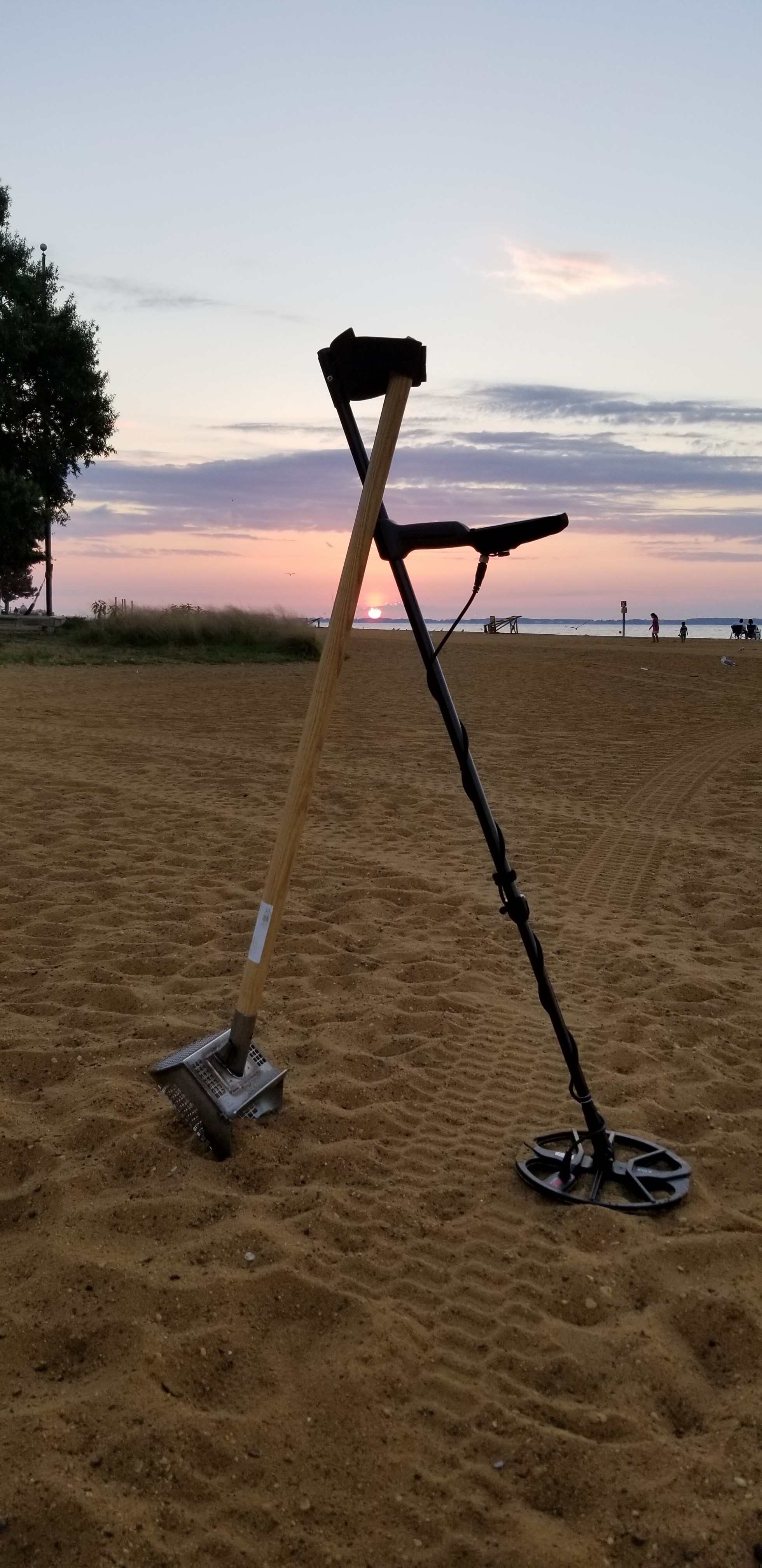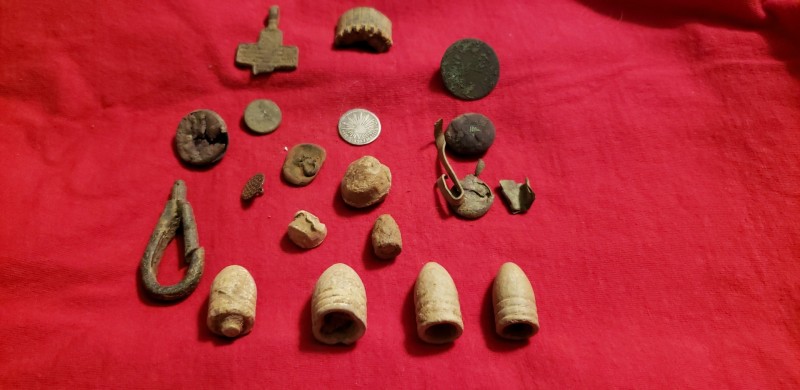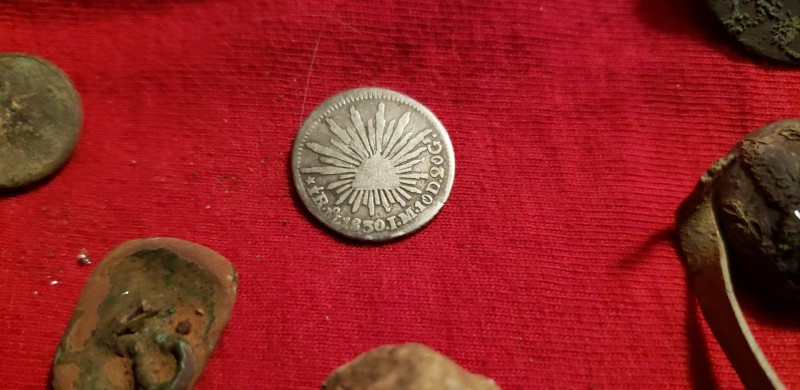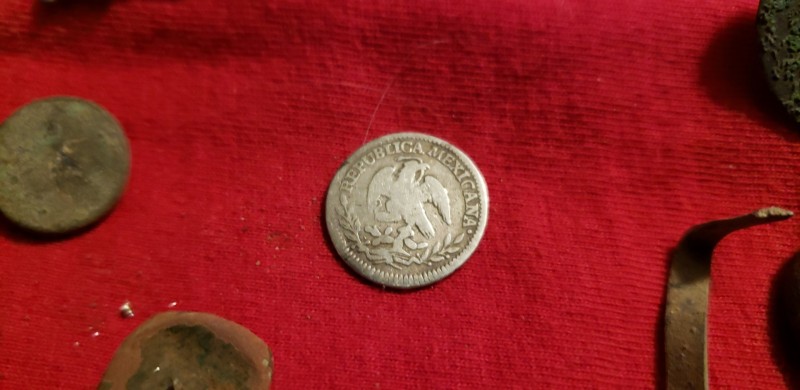-
Posts
6,131 -
Joined
-
Last visited
Content Type
Forums
Detector Prospector Home
Detector Database
Downloads
Everything posted by Chase Goldman
-
Thanks, Rick, you nailed the explanation I was looking for. I suppose also, that just like any PI, even under this scheme, you will be digging the pull tabs and foil freshness tops as well but avoiding the bobby pins and ferrous/steel tent stakes, bottlecaps, and even the large aluminium tent stakes and perhaps even high mass lead sinkers other PI's will sound off on at the beach. Besides the belt plates, this might be of concern for relic hunters who also recover minie balls and other large lead projectiles.
-
Rick mentioned Culpeper in another Impulse AQ thread and as a VA relic hunter myself, I am interested in a lighter weight alternative to the GPX I use specifically for relic hunting in hot soil that also incorporates robust iron rejection (somewhat absent from the TDI, so I am not interested in going back to that unit) and some level of foul weather protection that the GPX's lack. The GPX settings revolve primarily around gold prospecting with beach hunting and MILD ground relic detecting presets incorporated somewhat as secondary use afterthoughts. They work well for hot ground relic detecting when set up properly, but when it is all said and done, the GPX is a nugget machine first and foremost, doesn't work as well as a VLF in very high density iron trash conditions, cannot differentiate modern non-ferrouse trash from non-ferrous relics as well as a VLF, and it is also ergonomically challenged in both weight and with it's external battery/audio amplifier pack design with several cables and connectors to deal with that are constantly being strained and subject repeated abuse in the field. I am looking for a compact yet powerful relic centric PI design that incorporates iron rejection and since FT appears to be developing a beach centric (gold rings) as well as gold field centric (gold nugget) variant, I suspect there are feature or tuning setup limitations or perhaps unneeded or suboptimal beach features (e.g., this volcanic sand setting - is it useful in hot soil too?) on the AQ that make it a less than an ideal (but perhaps workable) terrestrial relic machine. I am interested in learning specifically about those limitations so I can decide whether to wait for the terra variant or if this detector line is worth the trip altogether. Prospecting is not of primary concern for me, but there is obviously a lot of overlap between these three PI applications. Put another way, I don't use a PI at all my relic sites because the soil conditions are not as limiting as they are at the sites where I primarily use my GPX or they may be contamnated with thick iron junk. But since the PI is always going to be deeper than my primary VLF machines regardless of soil condition, why not use them when high ferrous or not ferros trash conditions are not an issue? Well the answer is simple, the GPX ergonomic disadvantages generally outweigh the performance advantages over vlf, so I am going to generally reach for that VLF machine when soil conditions are tolerable. I would like that equation reversed. I would like a grab and go, ergonomically convenient PI with decent iron reject that would be my preferred relic machine under most conditions with the VLF reserved for the most challenging trash conditions where separation through recovery speed and discrimination (versus ferrous rejection or blanking which exacerbates ferrous masking) are preferred feature attributes. Looking forward to Rick's reports.
-
W Which brings me to my sore point on the Vanquish coils. All I am going to say is big opportunity missed by Minelab not including some degree of cross compatibility across their Multi IQ line.
-
With iron volume on the ORX (not present on the Deus in gold field mode) it is just as noticeable without having to look at the screen, but IAR does have its advantages in milder soils. I suspect that ORX Iron volume is activated by the same algorithm that is used to ID ferrous and apply IAR, so IAR can be somewhat redundant on the ORX but still useful to reduce audio fatigue, I suppose. (Ha, Jeff you beat me to it. Lol).
-
Just to add onto or clarify what Steve said above. He keyed onto your DST question (bottom line, don't worry about it) but to answer your specific question regarding whether All Metal affects the VDI numbers, the answer is no. They are consistent whether or not you are in all metal. Liked the F75 but have since moved onto the Deus and Equinox for relic, beach, and coin detecting. But I liked the F75 ergonomics and performance so much, I have hung onto it even though it mainly guards the garage for me now. I relic hunt around the mid-Atlantic, primarily Virginia. Have a good outing and let us know how it turned out.
-

Small Audio Equalizer To Adjust Iron Audio?
Chase Goldman replied to kac's topic in Metal Detector Advice & Comparisons
Thank you! EL NINO, it looks like this is looking for low levels from a guitar pickup. I am afraid that the headphone output from a detector is going to overdrive this thing into saturation and then you are going to have the line level output issue you mentioned. But am willing to try it out for fun. -

Small Audio Equalizer To Adjust Iron Audio?
Chase Goldman replied to kac's topic in Metal Detector Advice & Comparisons
Ok, I consider myself somewhat competent at using search engines and so forth, but for the life of me cannot get this gadget to pop up in any search phrase I use whether on google or at either Amazon or AliExpress. Any chance you could throw me a bone and post a link, manufacturer, or model number so I can check this out for myself. Much appreciated. -
There are some subtle differences and improvements that XP has made with the Gold Field program as implemented on ORX vs. Deus including switchable iron volume which does not exist on the Deus implementation of Gold Field plus I like the Orx pop up large font TID display and iron probability meter. Also, the ground grab implementation on the Orx is a little more straight forward on Orx. ORX lacks ground balance tracking, however. Overall, I am more and more impressed with ORX and Gary Blackwell's videos have unlocked some neat ORX secrets such as how to set up Gold Field properly for effective wet salt sand beach hunting that I can't wait to try out. One thing that Gary recommends in his field hunting skill video is cranking Iron Audio Reject (IAR) setting to the maximum setting of 5. That setting works well in mild ground, but is not effective in mineralized ground as it tends to chop up all signals due to the ferrous content of the mineralized magnetite in the soil. So just as he recommended on a wet salt sand ORX video at a beach that had a good deal of black sand mineralization, he set the IAR to 0.
-

The Correct Batteries For Beach Detecting
Chase Goldman replied to Steve Herschbach's topic in Metal Detecting For Jewelry
Nice product placement deal Garrett must have made with Duracell as the detector brand name is not obscured at all. Well played by the Garrett marketing team. Wish their engineering team was just as innovative. -
I like the coverage of the larger coil, but when it is all said and done for me, I pretty much am sticking with the stock coil even for beach detecting for many of the reasons mentioned above.
-

Amplifier & Speaker On The Cheap? Updated
Chase Goldman replied to GB_Amateur's topic in Detector Prospector Forum
Good point. The WM08 is a great external speaker port solution if you are solely using the Equinox. Unfortunately, however, the WM08 is not universal so if I want to use the same wireless method on both my Equinox and GPX, then BT APTX LL is the way to go and that is why I mentioned the BT LL APTX receiver/transmitter module that I can plug into my GPX as a transmitter for the Equinox wireless headphones or as a wireless receiver for amplified speakers and that I can universally use with either the GPX or Equinox. The Z-Lynk will work as well, but I am trying to minimize different systems so I have pretty much settled on the BT APTX LL universe as the wireless standard for my ML detectors. And an added benefit is that BT APTX LL hardware is comparably significantly less expensive than dedicated proprietary solutions such as Z-Lynk and ML's Pro Sonic system. -

Amplifier & Speaker On The Cheap? Updated
Chase Goldman replied to GB_Amateur's topic in Detector Prospector Forum
Chuck. Not sure what detector you plan to use your amplified speakers with, but if you are using the Equinox and have a way to fasten them to your suspenders or backpack straps as Doc mentioned, then the speaker (or speakers) can plug directly into your wireless headphones. In that configuration, the headphones can be flipped flat an rest on your neck/shoulder and they act as a bluetooth receiver but with the low latency sound coming through the amplified speaker vice the headphone speakers. I use a low latency bluetooth transmitter like the one below (about $29 US), that I can plug into the headphone jack of my GPX. That way I can use the same wireless headphones for my Equinox and my GPX depending on which detector I am using at the time. Works great. I mention this because you can use a low latency APTX BT receiver/transmitter in lieu of the headphones as your receiver for your amplified speakers. I don't see too many standalone BT speakers that also incorporate low latency APTX audio so they really do not work well for detecting. Just some ideas for you to kick around as you figure out your detecting speaker configuration. -

Small Audio Equalizer To Adjust Iron Audio?
Chase Goldman replied to kac's topic in Metal Detector Advice & Comparisons
Specs? Where available? Cost? -

Could Not Make Eqx To See The Target
Chase Goldman replied to nordic's topic in Minelab Equinox Forum
What was the size and composition of the coin? The issue typically cropped up or could be readily demonstrated with US silver or even clad dimes on edge. Your results are unusual but frankly I think you are over thinking it. Just go with the version that gives you the most confidence in the field, as all three behave similarly when it is all said and done. Putting too much stock in controlled test garden cases will always leave you second guessing yourself as you can never perfectly emulate every real world situation you will encounter. Too many variables. Pick a version and swing with confidence. -

Back At It...a First
Chase Goldman replied to deathray's topic in Metal Detecting For Coins & Relics
Tell me about it. But I like to give them to kids to get them interested in detecting or coin collecting. Yeah, adult collectors would turn their noses up at them but kids holding a 100 year old coin gets them thinking (though in today’s age of electronics, perhaps not as exciting as when I found my first toasted IHP at a swap meet when I was 9 or 10 years old which started me collecting, I suppose). -

Back At It...a First
Chase Goldman replied to deathray's topic in Metal Detecting For Coins & Relics
Don't fret too much if you can't find it, as that is a pretty common strike error, if it is indeed an error. Based upon the found condition of the coin it doesn't really change the collectable value. But a wheat is a wheat, and casually throwing it in coin star does seem like sacrilege to a coin collector, despite their minimal collectable value as they are dated items nearly 100 years old. -

Amplifier & Speaker On The Cheap? Updated
Chase Goldman replied to GB_Amateur's topic in Detector Prospector Forum
I would think your best bet would be to use a metal detector, instead. Seriously, though, are you asking whether they would make for a suitable alternative to using headphones with your detector? What detector do you plan on marrying them up with? Seems like a little too much claptrap to have dangling around while swinging a coil. Apologies if I am misinterpreting your intended usage. If you are looking for an amplified speaker for detecting check out speakers used for amplifying portable radios. But it would be hard to match the price you paid for those. What is key is if the frequency response will adequately amplify the narrow audio frequency spectrum of whatever detector you are using without being too bass heavy or tinny. -
Great condition. The only one I found has section taken out where the plow got to it otherwise very similar to yours. Great find.
-
You do have iron volume control on the Orx. It is just not a three step volume control. You can turn it on or off as desired (in the event of audio overload). I always keep iron volume at 3 on my Deus anyway, so it is no different on the ORX to me. Again iron volume level control just as the Deus tone tweaking options are a nice to have but non-essential features. Iron volume on or off is essential, however, otherwise you can’t fully take advantage of discrimination. IMO the delta in features between the ORX and the Deus is not commensurate with the price delta, making the ORX a great value with out having to give up many, if any, essential performance features.
-
Confused by these statements. How does iron volume mask targets?
-

My Thoughts On The Minelab Vanquish 540
Chase Goldman replied to abenson's topic in Minelab Metal Detectors
Excellent and thorough Vanquish analysis and write up. Couple of comments, though. ML is not providing any details, but based on what they have put out, they imply only a single Multi IQ profile is being used for all modes with the difference being the under the hood non-user-adjustable recovery speed and default disc settings they are using for each mode, but it appears based on your real world testing there may indeed be other differences going on. I suspect that ML is using something not too far off from the Equinox beach 1 mode Multi IQ profile to ensure a certain level of salt beach stability but the result might be the Worst of both worlds between say Park 2 and Beach 1 based on your results, but agree with you, who really knows other than ML and they are not providing any clarity. Did shifting into no disc mode provide any advantage whatsoever when dealing with iffy or clipped non-ferrous signals? The only thing I disagree with in this statement is that it implies perhaps a much greater performance delta between ORX and Deus. Based on my recent experiences with ORX that are documented on this site in other posts (which I know you’ve seen but others may not have seen), I think the ORX, despite its settings limitations vs. Deus, is a lot closer to Deus in capability than even I gave it credit for until I put it to the test the past few weeks. But I understand where you were coming from with that analogy. The Simplex/Anfibio comparison seems appropriate, though. -
Being a Deus user for the last five years (and assisting in Deus Bootcamps half that time), I can definitely say the ORX can get it done as well as the Deus for relic hunting. For pure coin shooters in parks, on the beach, or in fields, the myriad of tone options on the Deus are advantageous but not essential IMO. See my real world comparison here including the story behind these finds...
-

Minelab Equinox Battery Replacement Instructions
Chase Goldman replied to Steve Herschbach's topic in Minelab Equinox Forum
Don't want to open a can of worms but when Steve mentioned that he did not remember the 1 year warranty period for Equinox batteries, I decided to check to see if the information contained within the emailed announcement I imaged above was posted somewhere on the USA Minelab website, I found this warranty duration link, but it does not make the distinction between warranty coverage for the Equinox and its battery. To further confuse things, it mentions that Minelab batteries (non-specific) are warranted for 6 months (though I suspect those are for external battery packs such as those used for GPX). So who knows what truth actually is...go figure. But yeah, like Simon and Steve, I am pretty sure I will have moved on to the latest and greatest toy by the time it fully runs out.




